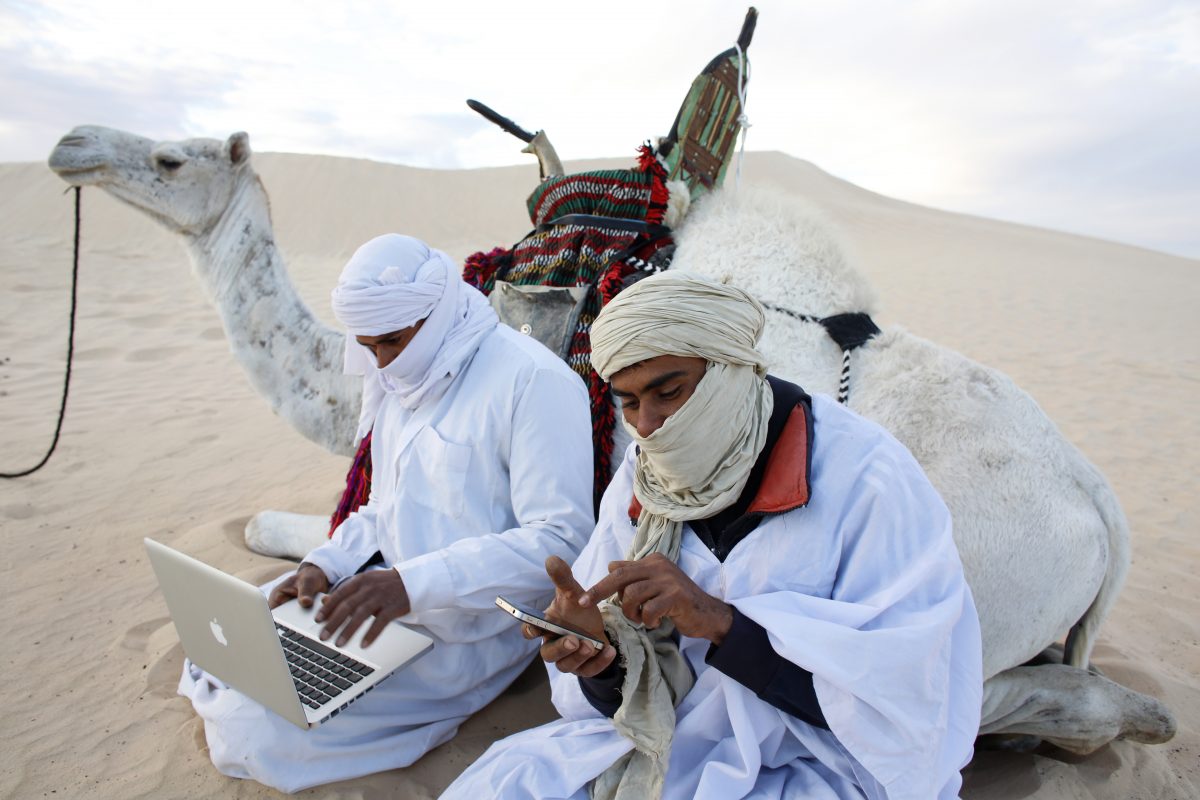
The growing phenomenon of the digital nomad – people who live and work where they want to, even in other countries from their employer – offers businesses a chance to secure the world’s best talent and retain experienced staff longer. People earning good money are starting to bring their spending and energy to rural areas, small towns and places with lower living costs.
Several countries have seen the potential and are working to attract digital nomads, but the barriers of negotiating work visas, tax and local employment laws remain high. What if digital nomads could become citizens of a ‘digital nation’ that saw its role as advocating for, protecting and smoothing the ride for its citizens? Plumia is one such nation starting to do just that.
Digital nomadism is growing fast
People have taken their work on the road for centuries, but it was tech legend Tsugio Makimoto who in 1997 predicted advances in tech would encourage people “to live, work and exist on the move.” He coined the term ‘digital nomad’ in the title of his book.
COVID-19 has seen digital nomadism grow faster than ever before. Statista says in 2020, nearly half the US workforce worked from home full-time. ‘Deep jobs’ platform MBO Partners report Google searches for ‘digital nomad’ have been increasing for years but soared in August 2020.

Kaspersky Endpoint Security Cloud
Secure your cloud
Straightforward protection for your small-to-medium-sized business – wherever you’re heading.
When the world went into lockdown, millions of remote workers abandoned US and European cities for suburbs, the countryside and other countries, creating ‘Zoom towns.’
Today, 35 million digital nomads worldwide spend around 787 billion US dollars a year. Location-independent workers now rival Canada in population with the global annual spending power of Saudi Arabia.
Large numbers of digital nomads in tech
MBO Partners research also found tech has the most digital nomads: 12 percent of the total digital nomad workforce. “COVID-19 prompted an acceleration of technology adoption and digital transformation,” says Lauren Razavi, digital nomad and author of Global Natives: The New Frontiers of Work, Travel and Innovation. “Companies are redesigning their organizations from the inside out, and workers across all industries are demanding more flexibility.”
World Economic Forum projects worldwide numbers of permanent remote workers will double from the start of the pandemic to the end of 2021, reaching 34.4 percent. Facebook, GitLab and other international tech companies are leading the way.
Economic value of digital nomads
Continued travel restrictions aside, anywhere with good internet is fair game for digital nomads. Several industries have noticed this new consumer base. After large revenue loss during the pandemic, hospitality and travel companies began catering to remote and location-independent workers with long-term stay discounts and alternative offices.
Cities dependent on tourism found creative ways to take advantage of the new remote tech worker diaspora with relocation cash incentives.
Oklahoma, Georgia and other US states woo remote workers with housing subsidies, free coworking membership and ultra-fast internet.
Countries devastated by lack of tourism are offering visas for remote workers. After Estonia started offering a digital nomad visa in 2020, Georgia, Bermuda and dozens of others followed. Portugal’s temporary stay permit and Germany’s freelance visa predate the pandemic.
Razavi says there’s still a lot to do. Many organizations still try to limit workers’ travel, creating blanket policies about where their employees can work, to comply with local employment regulations. Remote tech companies and entrepreneurs struggle to find global health insurance and offer retirement plans, often choosing to scale abroad without employee safety nets.
Individual country border, visa and tax regulations make staying in one place for more than a few months hard. A comb through the list of digital nomad visas reveals high fees and income requirements that may restrict millions.
What do we need to do to make sure tech workers and other digital nomads are free to roam? The answer may lie in a unique online movement called Plumia.
What digital nations could offer remote workers
Digital nations or internet countries like Plumia turn the idea of a country on its head. These projects map their borders around missions rather than physical spaces, redefining citizenship and nationality.
Started by Norwegian nomad health insurance company SafetyWing in 2020, Plumia is a group of digital nomads and remote workers “aiming to build a country’s infrastructure on the internet,” says Razavi – one of the project’s founding board members.
Plumia wants to connect workers on the move, create a worldwide community and offer services like any nation-state, such as social benefits, global identification and legal protection. “Rather than complaining about what exists, we want to rethink the systems and show there are better, borderless ways for the world to work,” Razavi says.
When I heard about Plumia I was fascinated, and later joined as a founding member. While I’m not yet a digital nomad, owning a location-independent business in an expensive US city helps me see the benefits of borderless support.
Future of work writer and entrepreneur Nicci Talbot has been watching Plumia with interest. She sees Plumia as a “contact point, an opportunity to connect with like-minded people and a springboard to develop ideas. Their activities and ambassadors are making the space more competitive, highlighting the growth of remote working and giving digital citizens a global mindset,” she says.
Plumia has an active and growing community of over 1,000 members who gather on community and messaging platform Discord to network, discuss infrastructure and draft services. They’re working on identifying the best structure to support millions of remote workers worldwide and launching a member-driven set of services for nomads.
Plumia board members have launched an ongoing public speaker series, inviting future of work and legal experts from around the world to share knowledge and advise the project.
Borderless travel starts online
Plumia isn’t the only digital nation devoted to making movement easier for global citizens. The world’s first internet country was Wirtland, founded in 2008 as a “democratic and peaceful alternative… for people’s self-identification,” according to its Statute. Wirtland has a newspaper, 8,000 citizens (‘witizens’) and a currency. Wirtland tried to gain recognition by acquiring lands in 2019.
Digital Nomad Nation has a similar mission to Plumia. It has 140,000 members worldwide and aims to advocate for digital nomad rights and taxes, and eventually offer virtual residency.
Bridging the remote work gaps
To take full advantage of the work-from-anywhere movement, tech companies and entrepreneurs need digital solutions to analog workforce and travel problems. Digital nation projects like Plumia are easing remote worker bottlenecks and becoming a go-between for countries, companies and nomads.
Razavi, as a digital nomad since 2013, has ideas about the best approach.
We live at a time when ordering a taxi, booking accommodation and connecting virtually is seamless and instant, yet government and citizenship services are stuck in the 20th century.
Lauren Razavi, digital nomad and author
“The starting point is to serve remote workers and digital nomads with useful products and services that bridge old and new,” she says. “A digital platform, something I call the Global Citizen Record, could help remote workers and digital nomads navigate different countries’ visa systems easily.”
Global Citizen Records (GCR) would, in theory, include stored identification data, proof of residency, income and education, and background checks. It could hold vaccination records, acting as a virtual passport during the pandemic.
Talbot, a fan of Razavi’s concept, agrees. “GCR would help streamline things and potentially solve some problems with remote work and travel.”
Plumia and other digital nations can also offer location-specific services, connecting nomads with on-the-ground communities, housing and coworking spaces. They can meld virtual accessibility with social safety net offers like international health insurance and retirement plans or become providers for remote companies wanting to offer global employee benefits.
Digital nomadism is growing fast. These remote workers and consumers have moved beyond Instagram laptop beach shots to the forefront of a new global way of life. Internet nation projects like Plumia highlight how eager digital nomads are to help enrich and sustain this shift, and empower others to choose how and where they work.


